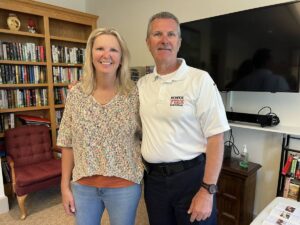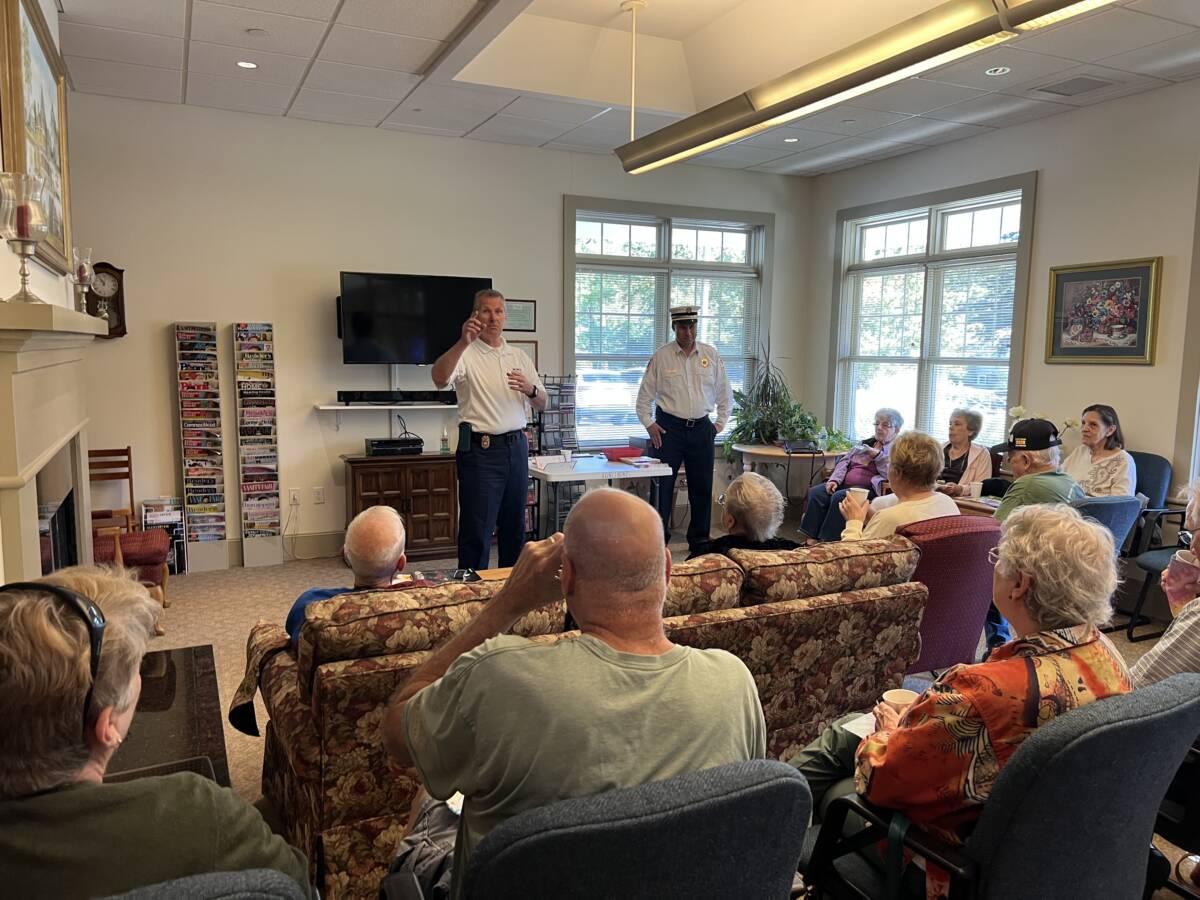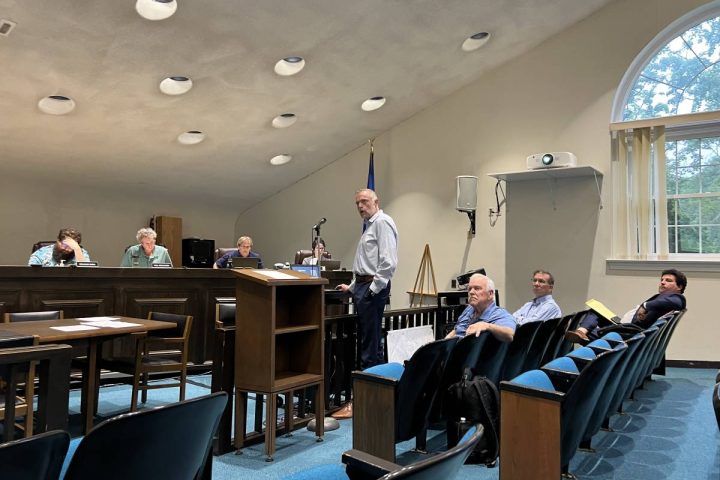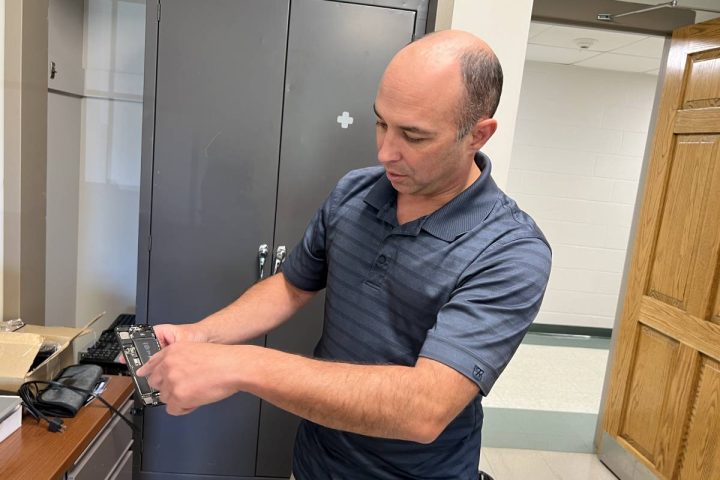MONROE, CT — Most house fires occur over the holidays when families are preparing Thanksgiving and Christmas dinners, candles are lit, extension cords are used for lights, and homes are heated with oil burners, space heaters and wood burning stoves.
Some fires are not preventable, like the time a lightning strike hit an invisible dog fence and followed the wires to a home’s garage, but most are.
On Tuesday morning, Fire Marshal William “Bill” Davin and Monroe Fire Chief Kevin Catalano visited the Monroe Senior Center to talk about fire safety for a Fire Prevention Month event, a time when Stepney, Monroe and Stevenson firefighters are visiting schools and daycare centers to share tips that can save lives and personal property.
Davin said something as simple as cooking an egg in the morning, while wearing a bathrobe with fluffy sleeves could cause a fire when a sleeve hangs too close to the burner of a gas stove. In fact, cooking is the leading cause of house fires.
When cooking, Davin said it’s easy to become distracted, but if you’re frying or boiling something, he said you should keep an eye on it. The MVFD has a Stand by Your Pan campaign, encouraging people not to leave food unattended when cooking.
Davin also said not to put things on the stove when its not in use, such as a laundry basket. “Try to keep a little area around the burner clear,” he said of how people can put things like oven mitts or boxes of food near the stovetop.
If a pan bursts into flames, Davin said, “don’t throw water on a grease fire. It makes it worse,” adding baking soda works and, if you can safely do it, putting a lid on the pan.
He said a fire needs three things to burn: fuel, air and heat. Like a triangle, when you take one side out, it will collapse, according to Davin.
Davin recommends turning off a burner if a pan catches fire to take away the heat source, rather than taking the pan off the burner, because that could make it spread to the cabinets, for example.
If there is a brush fire in your yard, rake away dead grass around it to take away the fuel source, Davin said.
‘Count your blessings’

Davin remembers a call when an older man in poor physical condition lost his life in a fire caused by turning on the wrong burner.
“He got out safely, then went back in to change and get keys,” Davin said. “We lost him. Don’t worry about your stuff. The important thing for us is to get you out. Once you’re out, count your blessings.”
Davin acknowledged how difficult it can be to lose your belongings and said insurance can replace much of it.
Catalano said firefighters’ priorities are first making sure everyone is safe, then protecting personal property. In the event of a fire, both Davin and Catalano said the best thing to do is to get out of the house and call 911.
Lou Marino, a life member of the MVFD, was among those in the audience. He said a lot of people resist fleeing a burning home, because they don’t want to lose their pets. But he said people should always choose their own lives over their animals.
Davin said if you leave a door open, most pets will find their way out on their own.
He recalled a fire on Barn Hill Road where the resident did not care that her house was being gutted. All she cared about was her cat. The next day, Davin saw her with the cat in her arms. Though it was an indoor cat, she found it safely under the shed outside.
Smoking can be fatal
Davin said smoking is not as common of a cause of fires as it used to be, but recalled one incident when a young woman’s vape pen exploded inside her car, catching her pants on fire.
Catalano said smoking continues to be the leading cause of fires with fatalities, when smokers fall asleep and a cigarette or other lit smoking material is dropped. “Last year we had two in one month,” Davin said of fatal fires. “One fatal fire was from smoking.”
Catalano said the second leading cause of fires is home heating, especially space heaters.
“Portable space heaters could be your friend or worst enemy,” Davin said, adding you should not use an extension cord or surge protected power strip for one, rather it should be plugged directly into a wall outlet.
Davin said to keep the area around a space heater clear, a minimum 18-inch radius.
Catalano said homeowners should also do preventative maintenance such as having your oil burner checked once a year and having routine cleanings for your chimney and flue, especially if you have a wood stove or use your fireplace often.
Hoarding hazards
 Catalano said hoarding is a hazard for firefighters and homeowners alike. The clutter can not only provide ample fuel for a fire, it also makes it difficult for occupants to escape and for firefighters to reach them.
Catalano said hoarding is a hazard for firefighters and homeowners alike. The clutter can not only provide ample fuel for a fire, it also makes it difficult for occupants to escape and for firefighters to reach them.
In Huntington, he said a firefighter stepped in a house and almost broke his ankle, adding it was hard to move around because the trash went up to his knees.
“A woman died. We couldn’t get into the house,” Catalano said.
Davin said residents should have smoke detectors in every bedroom and on every floor, including where the furnace is on the lower level. His office and local firefighters will do safety checks for homeowners who ask.
Older smoke detectors use nine-volt batteries, but newer ones use 10-year lithium batteries, according to Davin, who recommends using a marker to write the year on a new one so you know when to change the batteries.
He was asked about deaf people and said there are mattresses that vibrate to stir residents who are sleeping when smoke detectors go off. Another measure is the activation of flashing lights.
Aside from smoke detectors, firefighters recommend carbon monoxide detectors. Davin said he likes combination smoke/carbon monoxide detectors.
If someone is unsure if their carbon monoxide detector is working, Catalano said firefighters can come to their home with meters, because you can’t see, smell or taste carbon monoxide.
“Sometimes it’s nothing. Sometimes we can trace it to your furnace,” he said. “If you’re ever in doubt, just call us. There’s no embarrassment. If everything is good, you can go on with your business.”
Catalano also noted how firefighters vent a house only after doing a process of elimination, so it does not affect the meter readings during testing.
A lot of people like to start their cars on cold mornings to heat it up, before leaving the house. Davin recommends not doing this in the garage, where exhaust fumes can waft into the house. He suggests taking your vehicle out of the garage and warming it up 10 to 15 feet from the house.
Davin said ABC dry chemical fire extinguishers are the most common, adding if the gauge is red, it should be replaced.
Land of darkness
Catalano and Davin also gave safety tips for avoiding electrical fires. Catalano said extension cords are not meant to be permanent solutions or to be used for high powered electronics like treadmills.
Marino noted how a lot of people run cords under carpets when they don’t want others to see it going across the floor, which is another hazard.
Davin said he remembers a time when a woman said she smelled a burning odor by her fish tank. Using a thermal camera, firefighters identified the source as a cord underneath the carpet.
Catalano said you should buy power strips with surge protectors, but you should not overload a power strip with plugs to six electronics, for example.
“Monroe is the land of darkness,” Davin said. “The wind blows and the power goes out. There’s a surge when the power comes back and it can blow things out.”
He said a power strip should be replaced after a power surge, adding if it does not have a surge protector it may still work, but it will heat up. Davin said a good rule for power strips is to replace it when it’s three years old. When you buy a new one, Davin suggests using a magic marker to write the year on it.
One shortcut solution some homeowners use when there are not enough outlets is to plug one power strip into another for more electronics. Davin said this is unsafe and should never be done.
“Our grandkids are watching us,” he said, “so if you’re doing something on thin ice, grandkids will follow our lead.”
All respectful comments with the commenter’s first and last name are welcome.






